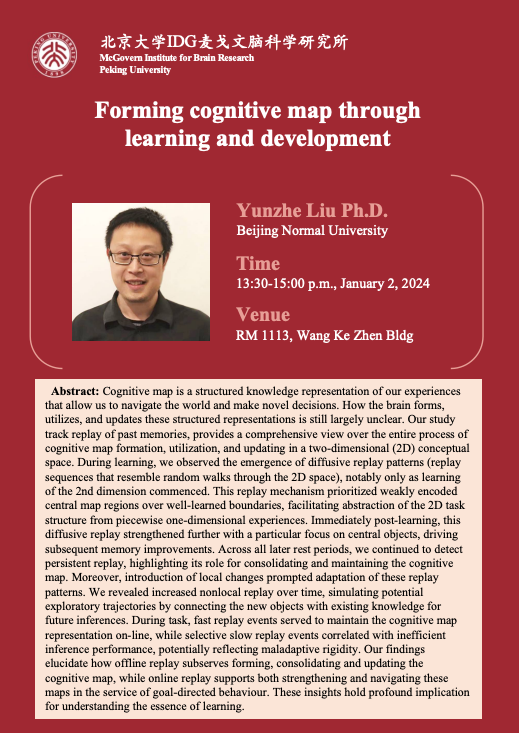
Speaker: Yunzhe Liu Ph.D., Beijing Normal University
Time: 13:30-15:00 p.m., January 2, 2024, GMT+8
Venue: RM 1113, Wang Ke Zhen Bldg
Abstract:
Cognitive map is a structured knowledge representation of our experiences that allow us to navigate the world and make novel decisions. How the brain forms, utilizes, and updates these structured representations is still largely unclear. Our study track replay of past memories, provides a comprehensive view over the entire process of cognitive map formation, utilization, and updating in a two-dimensional (2D) conceptual space. During learning, we observed the emergence of diffusive replay patterns (replay sequences that resemble random walks through the 2D space), notably only as learning of the 2nd dimension commenced. This replay mechanism prioritized weakly encoded central map regions over well-learned boundaries, facilitating abstraction of the 2D task structure from piecewise one-dimensional experiences. Immediately post-learning, this diffusive replay strengthened further with a particular focus on central objects, driving subsequent memory improvements. Across all later rest periods, we continued to detect persistent replay, highlighting its role for consolidating and maintaining the cognitive map. Moreover, introduction of local changes prompted adaptation of these replay patterns. We revealed increased nonlocal replay over time, simulating potential exploratory trajectories by connecting the new objects with existing knowledge for future inferences. During task, fast replay events served to maintain the cognitive map representation on-line, while selective slow replay events correlated with inefficient inference performance, potentially reflecting maladaptive rigidity. Our findings elucidate how offline replay subserves forming, consolidating and updating the cognitive map, while online replay supports both strengthening and navigating these maps in the service of goal-directed behaviour. These insights hold profound implication for understanding the essence of learning.
Source: McGovern Institute for Brain Research at PKU
